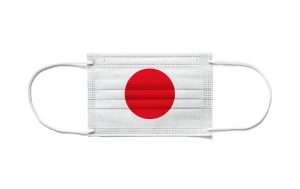Last month, Japan was being praised for its mysteriously low COVID-19 case counts, something that baffled experts. But after four months of an almost pandemic-free life, Japan is now facing a surge of new daily cases, which have spread at record breaking speed. The majority of infections are driven by the Omicron variant, and almost 40 percent of positive cases are “breakthrough” infections in people who have been vaccinated.
In mid-December, COVID-19 cases nationwide stood at below 200 each day. Following the New Year holiday period, cases have skyrocketed to over 8,000 new daily cases nationwide, which is an approximately 14-fold increase compared to the previous week. Concerns are growing that the surge in cases could cause Japan’s healthcare system to collapse.
The Japanese government announced that three southern prefectures – Okinawa, Hiroshima, and Yamaguchi – will fall under a quasi-state of emergency running from Sunday until the end of January in an effort to curb the spread of Omicron. There is also the possibility that restaurants and bars will be asked to shorten business hours in areas where infections continue to increase. Tokyo Governor Koike Yuriko announced a review of the number of admissions to government facilities and the number of people allowed to use restaurants, which currently have a limit of eight people per group. Meanwhile, the Tokyo metropolitan government has also lifted the COVID-19 alert system from green to yellow, which indicates spreading infections.
Last week the Japan Medical Association announced that the country had officially entered a “sixth wave” of COVID-19 cases and stressed a sense of urgency around the pressure being put on the medical system. The head of the organization, Nakagawa Toshio, acknowledged that the spread of infection is happening considerably faster than the Delta variant, which was behind the explosion of cases during the Tokyo Summer Olympics last year. However, Nakagawa said that the current situation did not warrant a state of emergency declaration, based on the present availability of hospital beds.
There are concerns that in the next two months the Omicron variant will continue to spread. One projection has the surge reaching its peak by March 4, with approximately 28,775 positive daily cases nationwide, surpassing the previous peak in summer 2021.
The National Center for Global Health and Medicine warned of an impending explosion of cases and explained that the ratio of new positive cases has increased significantly to a level never experienced before.
The Tokyo metropolitan government has pledged to secure 6,919 hospital beds and 7,900 rooms for overnight treatment. That’s more than double the number of rooms secured during the summer 2021 fifth wave, which was dominated by the Delta variant.
Last year during the fifth wave, 60 people died from COVID-19 while receiving treatment at home due to hospitals reaching full capacity. The government’s approach to the current wave will focus on the implementation of early treatment to prevent moderate to serious illness and ensuring public health centers are not overburdened with home health monitoring as home recovery cases increase.
The spread of infections on U.S. military bases in Japan is also adding to political tensions over escalating COVID-19 cases. Last week it was revealed that U.S. military personnel have been exempt from PCR tests when entering Japan since September, leading to COVID-19 outbreaks on several U.S. bases across Japan. Clusters have increased at Iwakuni air base in Yamaguchi prefecture and Kaden air base in Okinawa.
Japan has attempted to stem the surge by requiring U.S. personnel to wear masks outside the base and implementing mandatory PCR testing on personnel traveling to Japan on military aircraft.
The Japan-U.S military Status of Forces Agreement stipulates that U.S forces are not subject to Japanese laws when entering Japan, which exempts them from mandatory quarantine. However, some residents and Japanese employees of the U.S. Air Force in Okinawa have criticized the lack of preventative measures on base and urged the government to prioritize the Japanese Constitution and protect the rights of citizens.































